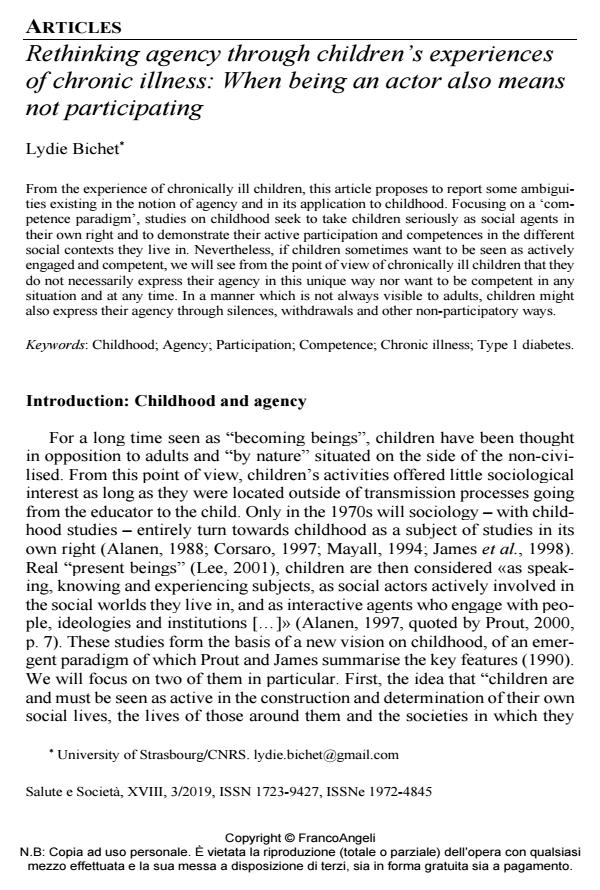Rethinking agency through children’s experiences of chronic illness: When being an actor also means not participating
Journal title SALUTE E SOCIETÀ
Author/s Lydie Bichet
Publishing Year 2019 Issue 2019/3 Language English
Pages 14 P. 11-24 File size 160 KB
DOI 10.3280/SES2019-003002
DOI is like a bar code for intellectual property: to have more infomation
click here
Below, you can see the article first page
If you want to buy this article in PDF format, you can do it, following the instructions to buy download credits

FrancoAngeli is member of Publishers International Linking Association, Inc (PILA), a not-for-profit association which run the CrossRef service enabling links to and from online scholarly content.
From the experience of chronically ill children, this article proposes to report some ambiguities existing in the notion of agency and in its application to childhood. Focusing on a ‘competence paradigm’, studies on childhood seek to take children seriously as social agents in their own right and to demonstrate their active participation and competences in the different social con-texts they live in. Nevertheless, if children sometimes want to be seen as actively engaged and competent, we will see from the point of view of chronically ill children that they do not nec-essarily express their agency in this unique way nor want to be competent in any situation and at any time. In a manner which is not always visible to adults, children might also express their agency through silences, withdrawals and other non-participatory ways.
Keywords: Childhood; Agency; Participation; Competence; Chronic illness; Type 1 diabetes.
- Alanen L. (1988). Rethinking Childhood, Acta Sociologica, 32: 53-67. DOI: 10.1177/00016993880310010
- Alanen L. (1994). Gender and Generation: Feminism and the ‘Child Question’. In: Qvortrup J., Bardy M., Sgritta G., Winterberger H., editors, Childhood Matters. Social Theory, Practice and Politics. Aldershot: Avebury.
- Alanen L. (1997). The Politics of Growing Up, Seminar paper given at Keele University, March 1997. Cited in: Prout. A., editor (2000), The Body, Childhood and Society. London, New-York: Palgrave MacMillan.
- Alanen L. (2005). Womens’s Studies/Childhood Studies. Parallels, Links and Perspectives. In: Mason J., Fattore T., editors, Children Taken Seriously in Theory, Policy and Practice. London: Kingsley Publishers.
- Baszanger I. (1998). The Work Sites of an American Interactionist: Anselm L. Strauss, 1917-1996. Symbolic Interaction, 21(4) : 353-377.
- Bjerke H. (2011). Children as ‘differently equal’ responsible beings: Norwegian children’s views of responsibility. Childhood, 18(1): 67-80. DOI: 10.1177/090756821037198
- Corsaro W.A. (1997). The Sociology of Childhood. Thousand Oaks: Pine Forge Press.
- Favretto A.R., Zaltron F. (2014). Health in everyday life. The competences and autonomy of children and adolescents in treatment practices. Italian Journal of Sociology of Education, 6(3): 219-243.
- James A., Prout A. (1990). A new paradigm for the sociology of childhood? Provenance, Promise and Problems. In: James A., Prout A., editors, Constructing and reconstructing childhood. New directions in the sociological study of childhood. London: Routledge.
- James A., Jenks C., Prout A. (1998). Theorizing Childhood. Cambridge: Polity Press.
- Gabe J.P., Olumide G., Bury M.D. (2004). ‘It takes three to tango’: A framework for understanding patient partnership in paediatric clinics. Social Science & Medicine, 59(5): 1071-9.
- Garnier P. (2015). L’«agency» des enfants. Projet scientifique et politique des «childhood studies». Education et sociétés, 36(2): 159-173.
- Hutchby I., Morran-Ellis J. (1998). Situating Children’s Social Competence. In: Hutchby I., Moran-Ellis J., editors, Children and Social Competence. Arenas of Action. London: Falmer Press.
- Hutchby I. (2007). The Discourse of Child Conselling. Amsterdam & Philadelphia: John Benjamins.
- Mayall B., editor (1994). Children’s Childhoods: Observed and Experienced. London: Falmer Press.
- Mayall B. (2003). Generation and Gender: Childhood studies and Feminism. In: Mayall B., Zeiher H., editors, Childhood in Generational Perspective. London: Institute of Education.
- Prout A. (2005). The Future of Childhood. Towards the interdisciplinary study of children. London: Falmer Press.
- Rose H.D., Cohen K. (2010). The Experiences of Young Carers: a Meta-Synthesis of Qualitative Findings. Journal of Youth Studies, 13(4): 473-487. DOI: 10.1080/1367626100380173
- Strandell H. (2010). From Structure-Action to Politics of Childhood. Sociological Childhood Research in Finland. Current Sociology, 58(2): 165-185. DOI: 10.1177/001139210935424
- Strauss A., Corbin J. (1988). Unending Work and Care: Managing Chronic Illness. San Francisco and London: Jossey-Bass publishers.
- Such E., Walker R. (2004). Being Responsible and Responsible Being: Children’s Understanding of Responsibility. Children & Society, 18: 231-242.
- Sutcliffe K., Alderson P., Curtis K. (2004). Children as partners in their diabetes care. An exploratory research study. London, UK: Institute of Education, University of London.
- Children and Adolescents Faced with Chronic Illness: The Case of Type 1 Diabetes Virginie Vinel, Nicoletta Diasio, Lydie Bichet, in Revue des politiques sociales et familiales /2022 pp.175
DOI: 10.3917/rpsf.145.0175 - Les négociations de « l’équipement qui convient » : enjeux relationnels dans la prise en charge du diabète de l’enfant Lydie Bichet, in Anthropologie et Santé /2022
DOI: 10.4000/anthropologiesante.12074 - Enfants et adolescents face à la maladie chronique : le cas du diabète de type 1 Virginie Vinel, Nicoletta Diasio, Lydie Bichet, in Revue des politiques sociales et familiales /2021 pp.89
DOI: 10.3917/psf.138.0089
Lydie Bichet, Rethinking agency through children’s experiences of chronic illness: When being an actor also means not participating in "SALUTE E SOCIETÀ" 3/2019, pp 11-24, DOI: 10.3280/SES2019-003002